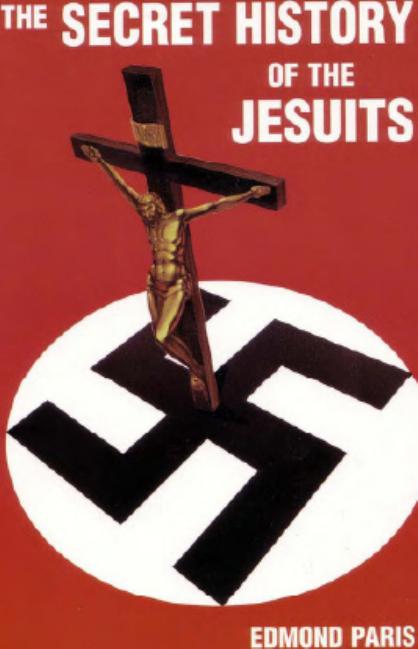Secret History of the Jesuits by Edmund Paris

Author:Edmund Paris [Paris, Edmund]
Language: eng
Format: epub, pdf
Tags: # Paperback: 208 pages # Publisher: Chick Pub; New Ed edition (August 1, 1983) # Language: English # ISBN-10: 0937958107 # ISBN-13: 978-0937958100
Published: 0101-01-01T00:00:00+00:00
9 The Years before the warâ1900-1914
So, as wrote the Abbe Brugerette: "Under the image of Jesus crucified, divine symbol of the idea of justice, "La Croix" had passionately cooperated with the work of deception and of crime against truth, uprightness and justice".(106)
Justice had nevertheless triumphed in the end and the Abbe Fremont, who did not fear mentioning the sinister crusade led by Innocent III against the Albigenses when referring to the Affair, seemed to be a true prophet when he said:
"The Catholics are winning and they think they will overthrow the Republic because of the hatred for the Jews. But they will, I am afraid, only overthrow themselves".(107)
(106) Abbe Brugerette, op.cit., II, p.478.
(107) Agnes Siegfried: "L'Abbe Fremont" (F. Alcan. Paris 1932, II, p.163).
In fact, when opinion was enlightened, the reaction was fatal. Ranc had learned the lesson of the Affair when he exclaimed: "The Republic will break the power of the Congregations, or she will be strangled". In 1899, a ministry "of republican defence" was constituted; Father Picard, superior of the "Assumptionists", Father Bailly, director of "La Croix", and ten other members of that Order were brought to trial before the tribunal of the Seine for breach of the law on associations. The Congregation of the "Assumptionists" was dissolved.
Waldek-Rousseau, president of the Council, declared in a speech pronounced at Toulouse on the 28th of October 1900: "Dispersed, but not suppressed, the religious Orders formed themselves again, bigger in numbers and more militant; they cover the territory with the network of a political organisation whose links are innumerable and tightly knit, as we have seen through a recent trial".
At last, in 1901, a law is passed, ruling that no Congregation can be formed without an authorisation, and that those who do not ask for it within the legal time will be automatically dissolved.
It will be these regulations, quite natural on the part of public authorities whose duty it is to check the associations found in their territory, which will be presented to the Catholics as an intolerable abuse. "A man's house is his castle", goes the saying; but the Church is not having any of it: the common law is not for her.
The resistance of the clerics to the application of the law would be enough to show how necessary it was. This resistance will only strengthen the government's attitude, especially under minister Combes; and Rome's intransigence, especially when Pius I succeeded to Leo XIII, will bring about the law of 1904, abolishing the teaching Orders.
After that, friction between the French government and the Holy See will be constant. Besides, the election of the new pope was done in significant circumstances.
"Leo XIII died on the 20th of July 1903. The conclave, meeting to designate his successor, gives, after several ballots, 29 votes for Cardinal Rampolla,â42 are needed to be electedâ, when the Austrian Cardinal Puzyna stands up and declares that His Apostolic Majesty the Emperor of Austria, king of Hungary, is inspired officially to exclude the secretary of State to Leo XIII.
Download
Secret History of the Jesuits by Edmund Paris.pdf
This site does not store any files on its server. We only index and link to content provided by other sites. Please contact the content providers to delete copyright contents if any and email us, we'll remove relevant links or contents immediately.
| Africa | Americas |
| Arctic & Antarctica | Asia |
| Australia & Oceania | Europe |
| Middle East | Russia |
| United States | World |
| Ancient Civilizations | Military |
| Historical Study & Educational Resources |
The Third Pole by Mark Synnott(676)
Money for Nothing by Thomas Levenson(624)
Christian Ethics by Wilkens Steve;(570)
The Economist (20210109) by calibre(563)
Made in China by Anna Qu(540)
100 Posters That Changed The World by Salter Colin T.;(498)
Reopening Muslim Minds by Mustafa Akyol(484)
Routledge Handbook of Contemporary India by Knut A. Jacobsen(476)
The Irish Buddhist by Alicia Turner(470)
Nonstate Warfare by Stephen Biddle(461)
Culture by Terry Eagleton(457)
The Great Pyramid Void Enigma by Scott Creighton(449)
The Age of Louis XIV: The Story of Civilization by Will Durant(435)
Ideology by Eagleton Terry;(432)
The Shortest History of China by Linda Jaivin(431)
Objects of Vision by Saab A. Joan;(425)
Banaras: CITY OF LIGHT by Diana L. Eck(423)
The Jews of Silence: A Personal Report on Soviet Jewry by Elie Wiesel(420)
Sybille Bedford by Selina Hastings(411)
